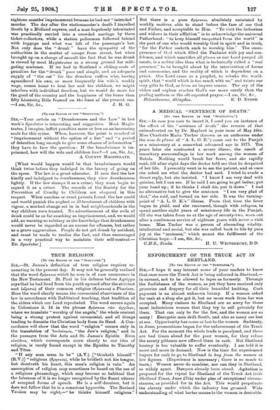A MEDICAL "SENTENCE OF DEATH."
[TO THZ ED/TOR OF TUB "BP carsTost.-j SIR,—In case you care to insert it, I send you an instance of the effect of the "sentence of death" the reverse of that aniinadverted on by Dr. Maylard in your issue of May 16th. Miss Charlotte Maria Tucker (known as an authoress under the nom de plume of "A. L. 0. E.") came out to the Punjab as a missionary at a somewhat advanced age in 1875. Ten years later she contracted a severe illness, the result of insanitary surroundings in her work among the women of Batala. Nothing would break her fever, and she rapidly sank, till after eight days the doctor told me that he despaired of her life. I presently went in to see the patient, and at once she asked me what the doctor had said. I tried to evade a direct reply, but she insisted. "I know I am very deaf with quinine, but I can see. If he said I am going to get better, put your hand up ; if he thinks I shall die, put it down." I had no alternative but to give the sentence. "I am very glad of that," she said, and turned on her side. It was the turning. point of "A. L. 0. E.'s " illness. From that time the fever began to yield, and she recovered, though with relapses, to spend another eight years of missionary life in the Punjab, till she was taken from us at the age of seventy-two, worn out after a continuous service of eighteen years with never a visit home. Miss Tucker was a person of abounding vitality, intellectual and social, but she was called back to life by pure joy at the "sentence," which meant the fulfilment of the Christian hope.—I am, Sir, &c.,






































 Previous page
Previous page